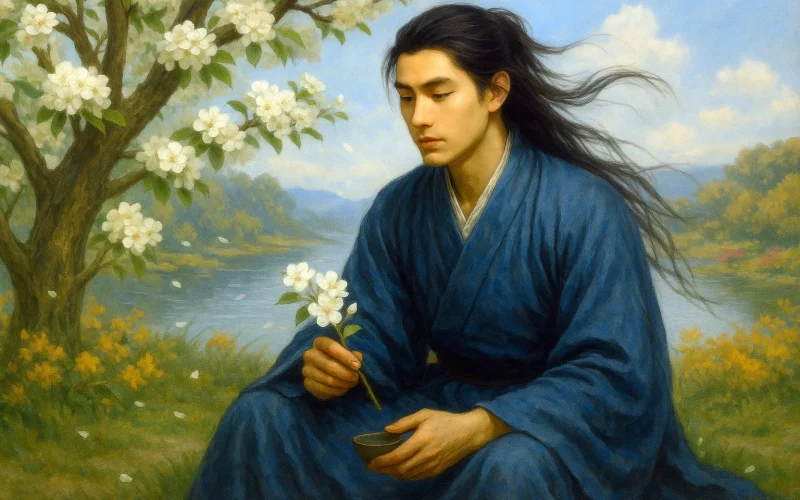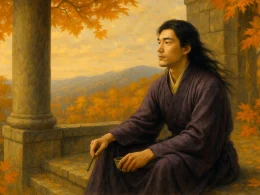Li Duan (李端, c. 743–785), courtesy name Zhengji, was a native of Zhaozhou (present-day Zhaoxian County, Hebei) and one of the "Ten Literary Masters of the Dali Era" during the Mid-Tang period. In his youth, he studied Daoism on Mount Lu. He earned the jinshi degree in 770 (the fifth year of the Dali era) and held various official positions, including Collator in the Imperial Library and Military Advisor of Hangzhou. Excelling particularly in five-character regulated verse, his poetry is characterized by its refined elegance and subtlety, often exploring themes of reclusion and the sorrows of separation. Over 250 of his poems are preserved in the Complete Tang Poems. His renowned works include "Listening to the Zither," which delicately captures musical imagery with lines like "The zither's golden pegs resound, / Jade hands before the chamber," and "A Lady's Feelings," which demonstrates his lyrical depth with "The moon sets, stars fade—dawn approaches, / A lone lamp burns as dreams evade." These works reflect the Dali poets' shift from the High Tang's grandeur to introspective subtlety.
Major Works
Life Overview
Li Duan entered officialdom through the imperial examinations, earning the jinshi degree and subsequently serving as a Censor, among other roles. These positions, which involved overseeing local officials and upholding legal discipline, indicate his standing and influence within the court. His bureaucratic experience informed his understanding of contemporary politics and social realities, with some of his works revealing concern for the nation's affairs.
Li Duan lived during the Kaiyuan and Tianbao eras of Emperor Xuanzong's reign, a time of High Tang prosperity that later gave way to border unrest and the cataclysmic An Lushan Rebellion. His poetry reflects the impact of these upheavals on frontier life and the populace.
Within literary circles, Li Duan associated closely with renowned poets such as Cen Shen, Wang Changling, and Du Shenyan. Recognized as one of the "Ten Literary Masters of the Dali Era," he contributed significantly to Tang poetry's evolution. His frontier and lyrical landscape poems are particularly celebrated, showcasing his unique sensitivity to borderland scenery and his preoccupation with the nation's fate.
Li Duan's official career appears to have been stable, without dramatic fluctuations, yet his works reveal a deep engagement with state affairs and a talent for depicting nature and garrison life. His poetry—marked by plainspoken naturalism, lucid language, and sincere, nuanced emotion—has earned enduring praise from literati across dynasties.
Details of his later years remain obscure, with no definitive historical records on his whereabouts or exact death date. Nevertheless, his poems endure as vital components of High Tang frontier poetry.
Literary Achievements
Li Duan's oeuvre primarily comprises frontier-themed and lyrical poetry, with particular mastery of five-character quatrains and seven-character regulated verse. Building on the High Tang frontier tradition, his style is fresh and fluid, suffused with genuine emotion and a penchant for expressing national sentiment through landscape imagery.
His frontier poems often depict military life and borderland vistas, employing unadorned yet vivid language that evokes both the region's majestic scenery and the steadfast spirit of its defenders. His lyrical works similarly reveal a deep appreciation for nature and philosophical reflections on life.
Poetic Style
Li Duan's poetry emphasizes clarity and naturalness, with restrained emotion and unembellished diction. Unlike Cen Shen's bold exuberance or Wang Changling's tragic grandeur, his frontier verse leans toward understatement and serenity, embodying a composed and introspective aesthetic.
Skilled at using delicate landscape portrayals to convey the borderlands' vast desolation, he often renders natural scenes with concise language that imparts a sense of ethereal purity. His works interweave depictions of garrison life with longing for distant loved ones and musings on life's transience.
Representative Works
Li Duan's notable works include several frontier and landscape poems, among which the following are especially distinguished:
- "塞上曲": A vivid, succinct portrayal of borderland scenery and military life.
- "长安古意": A nostalgic meditation on the capital's bygone splendor.
- "送友人": A heartfelt expression of parting emotions.
Additionally, many of Li Duan's poems appear in Tang anthologies such as the Complete Tang Poems, earning acclaim from generations of scholars. Though less illustrious than Li Bai or Du Fu, his unadorned verse secures his place in High Tang poetry. Alongside his contemporaries, he advanced the frontier poetry tradition, enriching Tang poetry's thematic and stylistic diversity. His influence persists among later frontier poets, particularly in his nuanced depictions of borderland life and scenery, which exemplify the Tang frontier poetic tradition's multifaceted brilliance.























